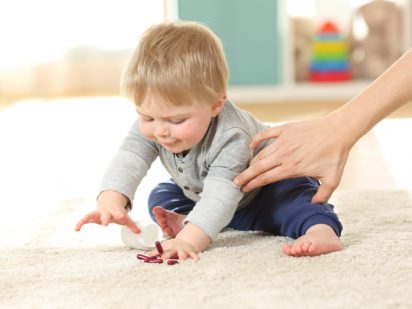According to the Centers for Disease Control and Prevention, over 300 children in the United States younger than 19 years of age are treated in an emergency department daily because of being poisoned. Additionally, poisoning is the third leading cause of unintentional injury death among children ages one to 19 years.
The majority of children being seen for poisoning in emergency rooms across the nation is accidental medication ingestion, which happens when children find pills that are unlocked and unattended, in items such as pill boxes, and unintentionally ingest them, explained Amber Emerson, RN, injury prevention specialist with Trinity Health and coordinator of Safe Kids Minot.
“Be sure that medicines are kept up and away,” Emerson said, noting that when grandparents come to visit, they tend to have medication in their purses or coats. “Kids are very curious.”
Medications, including vitamins and adult medicines, and other poisonous items, such as detergent pods for the laundry and dish washer, should be stored out of reach and out of sight of children, such as on a higher shelf or in a locked cabinet. “It only takes a few minutes, and it gives you one less thing to worry about,” Emerson said.
Safe Kids also recommends:
Keep all household cleaning products in their original containers. Also, when buying products, look for child-resistant containers to help prevent poisoning. “Child resistant does not mean child proof,” Emerson added.
Read and follow product labels. Check for ingredients that can be harmful to kids and make sure you use and store products according to their label. Kids can get into things quickly, so remember not to leave cleaning products or personal care products unattended while you are using them.
Remember products that might be harmful to kids. Check your home for products like cleaning supplies, liquid laundry packets, personal care products, plants, pesticides, alcohol, and medicine.
Save the Poison Help number in your phone and post it visibly at home: 1-800-222-1222. Specialists at poison control centers provide free, confidential, expert medical advice 24 hours a day. They can answer questions and help with poison emergencies.

